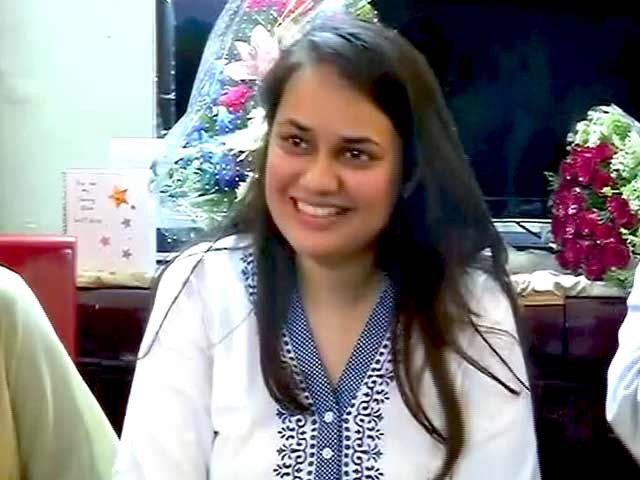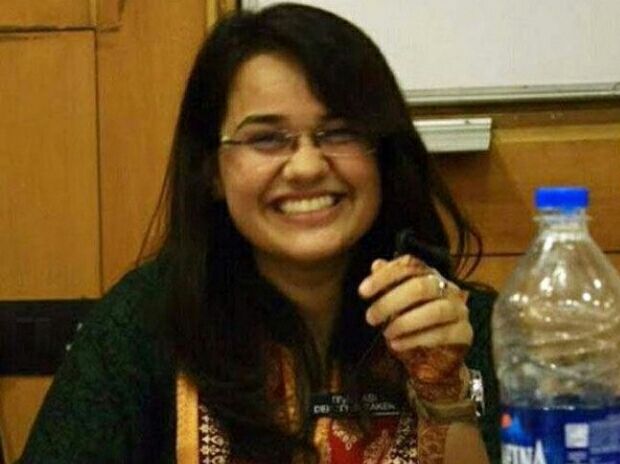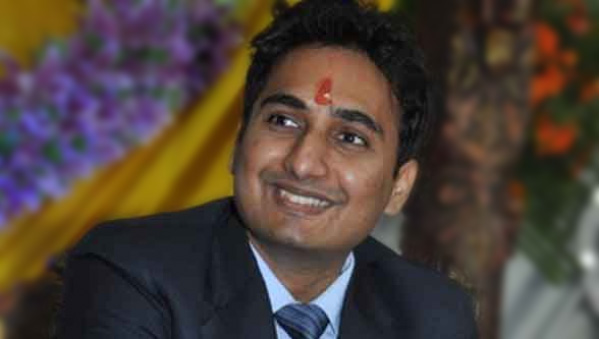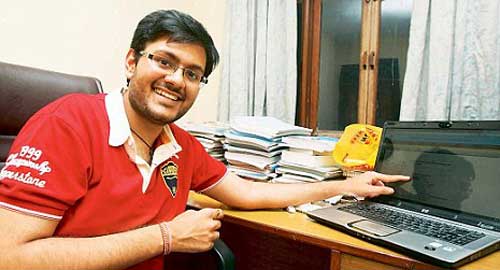UPSC Interview questions asked by the interview board (chairman and members) and answers of Gaurav Agarwal, IAS Topper.
Cp: XXX, you did this, did that, worked here…why left that job for civil services?
Me: Mam’, it was due to a combination of professional and personal reasons. The professional reasons include the mature of the civil services job. It gives a wide scope for public service, it gives wide decision making powers at our age, and it is so challenging and dynamic. Personal reasons included I wanted to come back to India, parental aspirations and also this job has a lot of respect in the society.Cp: didn’t you like that jo
Cp: didn’t you like that job? There was so much money as well.
Me: Mam’, money is not everything. I realised that when one has to work for 30-35 Years money cannot be the motivation. One has to look at larger things, so I switches because of factors mentioned earlier.
Cp: What has been the role of media in influencing people in the elections gone by?
Me: Media played a very important role. For example, the way it covered Mr. Modi’s Varanasi road show… the way it was showing the massive crowd… all swayed the people. What was happening in UP was being seen right in our rooms 24×7 in Rajasthan, Maharashtra, all over India. Moreover, there was massive advertising
M1: what are biosphere reserves?
Me: they are regions of great ecological significance so notified by the government.
M1: difference between biosphere reserves, national parks, wildlife sanctuaries?
Me: Sir I am not very clear about it, but from what I know, sanctuaries are notified as such by the state government, and biosphere reserves by the central government.
M1: And the national parks?
Me: Sorry sir, I don’t know.
M1: You are from Bharatpur?
Me: Sir I was born there…
M1: Bharatpur has a national park or sanctuary?
Me: A national park… Keoladeo National Park
M1: have u been there?
Me: Yes sir, Bharatpur is my nanihal… so as a child I used to go there on morning walk with my nanaji (grandparent).
M1: how should we protect environment?
Me: First we need to empower and involve the local communities. Because they are the ones who are closest to forests, know best about it and are dependent upon it. On the contrary, our laws tend to centralize powers in the hands of the forest department. Second, we need to change our accounting system to one which includes the value of ecological services. Right now it is only GDP where these ecological services are given zero weight. We need to give these services a tangible value in project appraisals.
M1: In project appraisals, what are the social costs?
Me: Typical project appraisals only capture the market prices or costs to private parties. Social costs are the costs to the society. There may be instances where the cost to private party may be different from the cost to the society. For example, if a project is being setup which will lead to migration, the cost of migration for the private operator may be taken as 0, but it will have real costs on society in terms of destruction of family structure, destruction of social capital…
M2: u acted n edited a movie in the college. What was it?
Me: It was a small movie we made based on then released Kaante. 🙂 We were a group of students studying in our college who get caught by the dean while cheating in an exam. The dean expels us. So we decide to take a revenge on the professors by looting the bank where they used to keep their savings. 🙂 We get caught doing that also and end up as sweeper, waiter etc.
Cp: How did you loot the bank? Through computers?
Me: No mam, we looted it physically like in the movie kaante. 🙂
M2: what was the message of the movie?
Me: It was a fun movie sir.
M2: fun movie.. Still there would be some message.
Me: Sir the message was that if one resorts to shortcuts in life, bad things happens to him ultimately.
M2: You talked about media earlier Social media. What is it and what are its pros and cons?
Me: Social media is via internet, sites like facebook, twitter, Google, blogs where users can share and interact. Its advantage is that it can preserve freedom of speech, specially in cases of autocratic government. For instance, in Turkey, the government tried to curb Twitter but it failed. Now this advantage also leads to its disadvantage. Because of the anonymity it offers and difficulty in suppressing its content… if we suppress one handle, people can create a new one and publish… it can lead to many problems. We saw last year how it led to exodus of people of North East from Bangalore, Pakistan uses it to flare up communal tensions in India…
M2: u blog… What do u blog about?
Me: I write about the things which I am doing, my observations, inferences, learnings.For example, the last blog I wrote was on the budget and economy of India, what are the challenges, what should be done. When I used to work in XXX, I used to write about markets, how to trade.
M2: u want to write a book. What kind of book?
Me: Sir, I presently write about things I see, my inferences and observations. So the book would be about that only.. what I see and learn in the field over next 10-15 years.. the problems I see and what policy measures we can adopt to solve them.
M2: u have a well built body n good height… Don’t you play any sports?
Me: (I was thinking I played so many sports, but to answer like that may expose me to questions from any sport) Sir I used to play football in college.
Cp: Yes he has mentioned that in the form…
M2: what position in football?
Me: I was the goalkeeper.
M2: don’t you play cricket?
Me: Yes sir, but only at the gully, street level.
M2: what is the role of the leg umpire?
Me: Sir, first if there is any overhead wide, then he calls it because he is in a better position to see. Then in case of runouts, he can see better. Finally, if the main umpire has any doubts, he can assist him.
M2: should,’t we replace umpire by technology?
Me: There would be practical problems in that. The decision of the third umpire comes after a lot of delay. So if we keep referring each appeal to the third umpire, there would be too many breaks in the game. Secondly, even the technology is not so accurate and we have seen some glaring errors being committed by it.
M3: (Some long story of Bangalore local government acquiring land for a foreign company) government acquiring land for private companies.. Isn’t this abuse of governmental power?
Me: Sir, if we leave land entirely to private players i.e. the private company buys it directly from the owners, there would be a market failure. Because say a company wants 100 acres to build a factory and buys 99 acres. The remaining 1 acre guy would get a veto power on the project. He may say give me 10 times the price of land otherwise you will not have your project. So we need governmental intervention in acquisition of land. But the real issue here is that the original owners must get full compensation and rehabilitation. What we should do is to give a part of the developed land back to the original owners… the value of developed land is generally much more than that of undeveloped land… this way even they can become stakeholders in growth and there won’t be any protests and development can happen.
M3: difference between vision, Mission, aims and objectives?
Me: Sir vision is at the top… its the broad overarching destination. For example, the government can have the vision that the governance reaches to that last person..the poorest man. Mission are the strategies which one can adopt to reach vision. The mission can be, use of technology for better delivery of services, climate friendly (:O I don’t know how this came to my mind) mission, poverty elimination mission…
M3: Aims and objectives?
Me: (thinking and trying) Aim could be we will reduce poverty by 2% per annum.
M3: Isn’t that target?
Me: Sorry sir, I am unable to tell about aims and objectives.
M3: difference between planned and market economy?
Me: Market economy is one where private sector plays a dominant role. The decisions of price and quantity produced are governed by market forces of supply and demand. Planned economy is like the one we have. There can be 2 types… one we had before 1991 where state was dominant, it used to fix the price and quantity produced mainly via PSUs. Then after 1991, we have moved to indicative planning.
M3: what are SEZs and your view on it?
Me: SEZs are special economic zones where the private operators are given a host of incentives to operate. It was a good concept… We have seen how SEZs have led to huge development in China. But the SEZ policy has come in for criticism that it has become a land grab scheme. Private operators are acquiring land in the name of SEZ but are not setting up any industry there, merely using it for real estate. Then the idea behind SEZ was to provide good infrastructure facilities also. But the size of our SEZs is so small. China has 5-6 large SEZs where it has provided all facilities. What we really need is a proper implementation of the policy. We need to have a few large SEZs instead of hundreds of small ones and then provide good governance and infrastructure there.
M4: your hobby is following macroeconomy and forming trading views. How?
Me: Sir I used to do this earlier in my job.
M4: but that was ur job, not hobby..
Me: Yes sir, earlier it was my job. But after quitting, I have pursued it as a hobby.
M4: Do you know about the trends in TV sector? Do you watch TV?
Me: No sir, not much (watch). As for the trends, I don’t know about the individual Companies but for the sector overall…
M4: ownership of media houses (Ambani deal) by corporates and politicians. There was a news even today. Is such a thing dangerous for economy, for democracy?
Me: Yes sir, it is very dangerous for the economy and democracy because freedom of media may be compromised. Most of these media houses are running into losses which lead them prone to such acquisitions.
M4: The media can also blackmail the government and corporates..
Me: Yes sir, and as we saw in the coal scam coverage last year, Zee news was accused of demanding bribes from Jindal for suppressing the adverse coverage.
M4: can we prevent it? How?
Me: By separating the editor team from owners.
M4: but is separation of editing team and management possible? How is it possible when both are in the same company?
Me: It is possible. In my previous job, there was a part of the bank which worked closely with companies and had access to private information. We, on the other hand, were on the public side and had no such access. This separation was made possible by our internal compliance team, auditors and central bank. Similarly in media, this
separation should be enforced by their compliance, auditors and an external regulatory.
M4: what are the things the new government should be doing in the economy?
Me: Sir, firstly, the new government should address the policy issues. For example, retrospective taxation, increasing FDI, cutting red tape, giving more confidence to bureaucrats…
M4: but they are against FDI in retail.
Me: Yes sir, FDI in retail is a bit of a grey area. But in other sectors, they are saying to allow FDI up to 49% via automatic route except for 3-4 sectors. Even in defence they are allowing FDI up to 49, 74 and 100% depending upon the kind of technology which is brought in.
M4: what other things?
Me: They should control the fiscal deficit. Although the previous government claimed reduction of headline number to 4.6%, but the quality of this fiscal deficit adjustment has been doubted by many experts. They say the government has merely pushed many subsidies to the next year. So some of these subsidies have to be removed.
M4: which subsidy they should remove?
Me: The fuel subsidy…
M4: won’t increasing diesel prices lead to higher inflation? There are so many critical Sectors like railways, trucks which need it.
Me: Sir there are 2 things here. One, yes higher diesel prices will push up inflation, but at the same time, the reduction of fiscal deficit due to lower subsidy will have a reducing effect on inflation and will offset at least a part of it. Next, what we can do is that we can compensate these critical sectors directly via direct cash payments. This way we can reduce the inflationary impact as well as prevent wastage of subsidy. Clearly we don’t want to subsidise the luxury cars running on diesel. 🙂
M4: is it possible politically to remove subsidies on gas cylinders?
Me: It is difficult, but given the strong mandate the new government has, it is possible.







